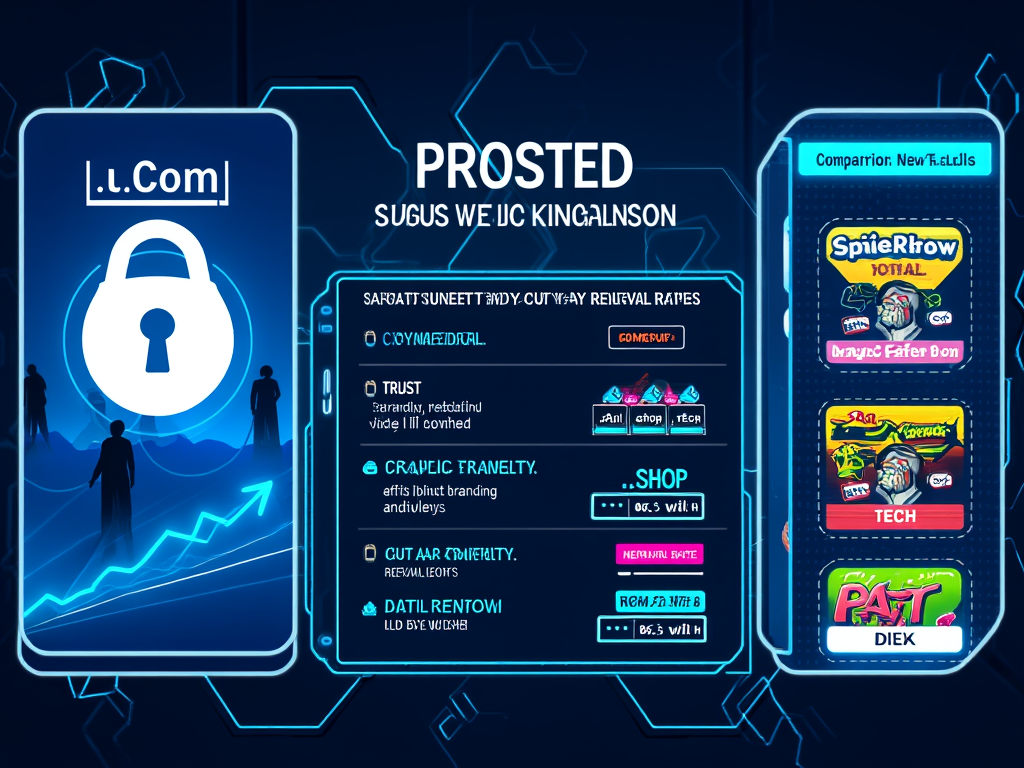A Guide to Domain Name Disputes and Resolution
Introduction
Domain name disputes are no longer just a concern for brands; they have become a pervasive issue for anyone with a digital footprint. The intersection of creativity, technology, and law has brought to light a convoluted landscape that can leave even the most seasoned entrepreneurs caught in a web of confusion. In a world where your domain name defines your online identity, understanding domain name disputes—and knowing how to navigate them—is an essential skill.
Imagine your brand's laughter echoing in the cyber-world, only to be drowned out by the clamor of another entity claiming a similar name. You’re not alone—many have faced the harsh reality of losing valuable digital territory to cybersquatters or facing potential trademark infringement without having any rights in the matter. As this tug-of-war ensues, your brand’s reputation hangs in the balance. So how do you keep your brand afloat amidst these turbulent waters?
Understanding Domain Name Disputes
What Are Domain Name Disputes?
At its core, a domain name dispute arises when the ownership or usage of a domain name conflicts with trademark rights, creating tension between domain registrants and trademark holders. Familiar scenarios include:
-
Cybersquatting: This practice involves registering domain names that are deceptively similar to well-known trademarks with the intent to sell them at an inflated price. It's like securing a prime piece of real estate in a bustling downtown area, only to ask the rightful owner for exorbitant rent.
-
Trademark Infringement: If someone registers a domain name that mimics a trademark's identity to mislead users, this could easily lead to disputes. Think of a coffee shop called "Starbux" that aims to confuse customers into mixing it up with the famous chain.
-
Bad Faith Registration: This term captures a more strategic exploitation, where individuals who register domain names with the explicit aim of disrupting competitors or extracting profits from confusion can face severe legal consequences.
With every click and search, the stakes rise. The realm of digital ownership is complex, and not having a firm grasp on the nuances could leave your brand at risk.
The Uniform Domain-Name Dispute Resolution Policy (UDRP)
The UDRP serves as a beacon of hope in this choppy sea, providing a structured approach to resolving disputes without the lengthy court battles. Established by the Internet Corporation for Assigned Names and Numbers (ICANN), the UDRP process is widely recognized globally, offering a streamlined alternative to traditional litigation.
To initiate a UDRP process, the aggrieved party must establish three primary elements:
- The domain name in question must be identical or confusingly similar to their trademark.
- The domain holder has no legitimate interest in that name—think of it as someone squatting in your office without permission.
- The domain was registered or used in bad faith, creating a harmful intent.
The UDRP process generally follows these stages:
- Filing a Complaint: A complaint is lodged by the trademark owner with a chosen dispute resolution provider, which includes evidence to back up their claim.
- Registrant's Response: The domain registrant has an opportunity to counter the allegations leveled against them.
- Panel Appointment: An expert panel is assigned to examine the dispute, consisting of one or three arbitrators.
- Decision Issued: A verdict is typically rendered within 60 days, potentially leading to either the cancellation or transfer of the disputed domain.
- Implementation: Following the decision, the registrar enforces the panel's ruling, completing the procedural aspect.
The cost of engaging in a UDRP may often start from approximately USD 1,500, a fraction of what legal fees would add up to in civil court procedures.
Alternative Dispute Resolution Mechanisms
While the UDRP shines as a popular choice, it isn't the only path available to resolve domain name disputes. Depending on the specific domain registry and jurisdiction, other methods come into play:
-
Dispute Resolution Service (DRS): For instance, Nominet employs its own framework for addressing .uk domain disputes, allowing mediation to aver disputes through cooperation rather than contention.
-
Arbitration and Mediation: Beyond administrative processes, arbitration or mediation can provide an alternative avenue. Here, parties may find common ground without formal decisions dictating outcomes.
-
Court Action: In thought-provoking cases where UDRP is not feasible, trademark owners may also knock on the courtroom doors, seeking injunctions or damages to protect their interests.
Practical Tips for Managing Domain Name Disputes
It's never wise to be caught off guard when it comes to potential disputes. Here are practical steps to shield your brand online and navigate the murky waters of domain contention:
-
Early Action: Keep a vigilant eye on domain registrations with proactive monitoring to detect potential infringements as soon as they surface.
-
Document Trademarks: Ensure your trademark registrations and usage are meticulously documented, leaving no ambiguity on your claims.
-
Consult Legal Experts: This is always a wise move—expert legal counsel can guide you through the impending disputes and their aftermath effectively.
-
Consider Negotiation: Before aggressive litigation kicks in, sometimes a simple dialogue with the domain holder can yield positive results without formal proceedings.
-
Be Prepared for Fees and Timeframes: Acknowledge the financial and time investments necessary for any dispute resolution effort, as processes can stretch on for long durations.
Domain name disputes are a reality we all must face in the digital era, where our virtual identity is increasingly intertwined with our brand's success. Keeping yourself informed and prepared is not just a capricious notion—it's an imperative.
FINDDOMAIN.GE (Internet services LLC) is a very interesting and rapidly developing IT company. The main directions are: web development, domain and web hosting. It also offers clients sub-services and outsourcing related to the main services.
BEST OFFERS:
Do you want to create your own company website or create your own online business on the Internet?
– WEB HOSTING
– DOMAIN REGISTRATION
– WEB DEVELOPMENT
– SITE BUILDER



Understanding the Role of Trademark Rights in Domain Disputes
The crux of most domain name disputes hinges on trademark rights. Your trademark is more than just a logo; it’s the embodiment of your brand's promise and reputation. However, safeguarding these rights can often feel like navigating a labyrinth, especially for those new to the digital landscape. Understanding how to lever these protections can turn the tide in your favor during disputes.
Establishing Trademark Rights
To effectively defend against domain name disputes, establishing clear trademark rights is paramount. The following factors contribute to solidifying your claim:
- Distinctiveness: Trademarks that are unique, arbitrary, or suggestive inherently possess stronger protections compared to descriptive or generic terms.
- Use in Commerce: The active use of a trademark in business can bolster its legitimacy. This includes not only sales but advertising and awareness-building efforts.
- Registration: Registering your trademark with relevant governments not only offers legal benefits but also serves as public notice of your claim. For instance, securing a trademark with the USPTO in the USA provides a safeguard against infringement.
Real-life examples of this dynamic play out daily. Consider brand battles that erupt when lesser-known entities attempt to capitalize on established names. With clear documentation backed up by registration, businesses can navigate these disputes with confidence.
Legal Remedies and What to Expect
When faced with a domain dispute, knowing your legal options and the anticipated outcomes is vital. Although some might opt for arbitration, others may need to prepare for court litigation where damage claims and injunctions may be involved.
Pursuing Legal Action
Legal action remains a viable—and sometimes necessary—route in certain scenarios. Here’s how you can anticipate proceedings:
-
Injunctions: Many business owners seek court orders to halt alleged infringers from using disputed domain names. This is especially crucial if there's a risk of consumer confusion impacting your business.
-
Damages: It’s also possible to pursue financial compensation for lost sales or opportunities due to the infringing use. Courts often consider the reputation of the trademark, the degree of confusion, and the intent of the infringer.
-
Costs and Time: Be mindful! Legal actions can incur significant costs and lengthy delays. Entering this arena requires patience and financial resources, making it crucial to weigh your options wisely.
Strategies for Preventing Domain Name Disputes
As the saying goes, an ounce of prevention is worth a pound of cure. While battling disputes is laborious, employing strategies to prevent them in the first place can save your brand from potential nightmares down the line.
Protecting Your Brand
-
Secure Domain Variants: When establishing a domain, consider purchasing common misspellings or variations of your brand to ward off cybersquatters. This practice acts like laying down digital barriers around your name.
-
Renew Domains Promptly: Don't let your domain registration lapse. Keep track of expiration dates and renew domains well in advance, as even a short lapse in registration can lead to disputes.
-
Engage in Active Monitoring: Regularly monitor domain registrations and potential infringements on similar names. Using tools and services dedicated to brand monitoring can help you catch problems before they escalate.
-
Educate Your Team: Ensure that everyone associated with your brand understands its significance. Equipped with knowledge, they can help spot potential domain threats early.
Final Thoughts on Domain Name Disputes
Domain name disputes, like the ebb and flow of the digital world, are inevitable. Yet, the storm can be weathered through proactive measures and an informed approach in protecting your rights. As businesses evolve in an increasingly interconnected world, maintaining vigilance over domain names not only safeguards your identity but fortifies your brand against competitors seeking to take advantage of your hard-earned reputation.
Take the time to educate yourself about UDRP and the various dispute resolution mechanisms available, while also keeping the importance of trademark rights at the forefront of your mind. By doing this, you'll navigate the complexities of domain name ownership with clarity and confidence.
For visual learners, the following videos can deepen your understanding of domain name disputes and resolution techniques:
- Understanding UDRP – Uniform Domain-Name Dispute Resolution Policy
- How to Protect Your Brand and Domain Names
References
- ICANN, UDRP Overview: ICANN UDRP Policy
- Nominet DRS Services: Nominet Dispute Resolution
- Cost Factors of UDRP: WIPO UDRP Costs
- Trademark Basics: USPTO Trademark Overview
Are you ready to take command of your domain name strategy? Your brand deserves nothing less than the protection it needs to flourish in the digital expanse.
FINDDOMAIN.GE (Internet services LLC) is a very interesting and rapidly developing IT company. The main directions are: web development, domain and web hosting. It also offers clients sub-services and outsourcing related to the main services.
BEST OFFERS:
Do you want to create your own company website or create your own online business on the Internet?
– WEB HOSTING
– DOMAIN REGISTRATION
– WEB DEVELOPMENT
– SITE BUILDER








